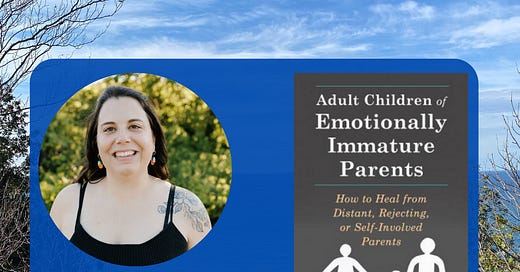Welcome, new book club friends! So glad you’re here. We’re diving into Chapter 7 today, but remember, you have full access to the archive, too! So feel free to go back and begin at Chapter 1. Also - it’s already time to start thinking about our next book - please drop any titles you may be curious about in the comments or reply and send them straight to me!
00:00
Welcome back to our book club and read-along together. We have quite a few new people here this week so I'm just going to briefly recap what we're doing. Together we are reading books and some of you are reading along with me and some of you are just listening to my recaps which is perfect.
00:16
You're welcome whichever way you would like to engage with this material. Right now we're reading adult children of emotionally immature parents. In the past we've read No Bad Parts, a book on internal family systems, and The Practical Guide for Healing Developmental Trauma, a book on the model called the Neuroeffective Relational Model.
00:36
Right now we're beginning chapter 7 of adult children of emotionally immature parents. Every two weeks I provide you with a recap with interpretation from a therapist who works with complex and developmental trauma point of view and occasionally I drop in little meditations or journaling exercises for you too.
00:54
Twice we meet live, once halfway through and once at the end which for this book will be at the end of August. And if you're here you also have full access to the archive so you can go back and listen to all the other chapters and all the other books whenever you'd like.
01:08
It also gets pushed through to all the podcast software so if you would like to listen on your phone, on your walk, you can listen on Spotify and Apple Music. So thanks for being here. I love getting to do this work and let's dive into chapter 7.
01:27
So this is a huge chapter and as always I will add in my little reminder to take things little bits at a time. All this time we've been kind of taking things in from an intellectual perspective but as we've been doing that we've been noticing ways that this might have impacted us in our childhood and ways that it might be impacting us now in our adult lives.
01:46
But what we're coming upon now is what really happens when we integrate all of this information. When we start to connect into the emotions, patterns, behaviors, thoughts, and body sensations that have been tied into to these roles that were foisted upon us, not because of our choice, but in these emotionally immature homes where we had no choice but to adapt, to stay in connection to our caregivers,
02:12
who themselves were not able to show up as parents, caregivers, and adults. In this chapter, Gibson is diving into what happens when we start to become aware of and observe these roles, these patterns that we've been in for a long time.
02:29
And this can create in many of us a sense of being out of control, a sense of failure, a sense of anxiety. There can be major grief and anger and fear that comes up with this because we are starting to recognize that we are not our patterns.
02:47
We are not this role that we have been thrust into. And if that is true, which part of us might feel like is a very good and exciting thing, another part of us can feel terrified. And so Gibson is exploring this idea of what is the true self.
03:03
And if you've been along with me for the other two books, you know that in NARM, this is referred to as the adult consciousness. In IFS, it is referred to as the self with a capital S. And we can think of it as the observer of everything that's happening, our true selves.
03:21
And this is an idea that has its core in many cultures, many therapeutic models, many ways of relating to the world of who we really are at our core. This is a huge shift and a huge question because what we're really asking is, who am I?
03:38
Who am I? If all of these thoughts and patterns and behaviors that I have done my whole life are not me, then who am I? And that can be incredibly earth shattering. And again, it's a push and a pull and a bind because of course, many of us are doing this work because we know we don't feel good.
03:55
We know we want something differently. But at the same time, a part of us desperately does not want something different. And that is why so many people will come into therapy talking about quote unquote self sabotaging when what they really mean is, I started to move toward what I want for myself or my true self or my true feelings.
04:15
And that was terrifying because a part of my brain encoded doing that as being a tiger. And so my brain protected me by using an old pattern of behavior to get me back into alignment. And that is not you self sabotaging because you think it's fun or because you just can't let yourself want anything.
04:34
That is a deeply protective road in your brain that all of these neural pathways have been created to keep you safe and keep you in connection with your emotionally immature parents and caregivers. So this question of who am I really is the ultimate question because we are ready to shed off these roles.
04:53
A part of us is, but the other part of us is still terrified. So what I want to tell you before we go. any further into this chapter is we can think of this not as creating a new us or not having to figure out from scratch who we are but more like we're taking off layers of armor.
05:13
So many of us since we were young children have been walking around wearing 10 or 15 suits of armor and it's heavy it's so heavy and we can't fully move and we can't be ourselves we can't play we can't be silly we can't do a cartwheel or whatever we might want to do but over time we could become so accustomed to wearing the armor that we don't even realize we're wearing it and so starting to take it off is like oh huh it's lighter maybe I kind of like that maybe I can walk a little more easily but another part of us is like oh absolutely not this is terrifying I feel so unprotected and unsafe because what we've learned is all along we must wear those protective suits of armor,
05:53
the perfectionism, the people pleasing, the internalizing, the intellectualizing, we must wear those to keep connection and make sure that our parents and those around us are okay. So many people when they come to this point and you may be here in real time feel an incredible bind and I want to reassure you that is normal, that is the old patterns in your brain mashing up with the new patterns you're creating,
06:17
the new questions that you are asking yourself. So please know this is not something you jump into in one chapter or one week or one month, this is a back and forth curiosity of who am I in this one tiny moment and then going back to the protective pattern.
06:36
And honestly this can be as small as, I use this example a lot because a lot of people can relate, you go to a coffee shop, you order a drink with milk because you have a dairy allergy, you watch them make it with dairy and then it is so terrifying to consider letting them know that you cannot drink that drink that you paid seven dollars and fifty cents for.
06:57
And that is a moment and if you haven't yet you could go back and read last week's written sub-stack, that is a moment where we get to practice something called a congruence experiment and when we are coming into our true self it's going to be a series of these experiments where we try on what do I want for myself versus what was safe in the past.
07:18
So in the past it wasn't safe to state your needs, it was terrifying, it was dangerous, it could upset the whole apple cart, your parent might withdraw from you for days or they might go off on you or a whole variety of things could happen in that slot machine effect of emotionally immature parents.
07:33
And so having needs now in the present, even something as quote unquote simple as letting them know they didn't make your drink correctly, sets off that survival pattern in the brain that makes it feel like our life is at stake.
07:46
When we're being curious about who am I really, what we call could do in that moment is try on a little experiment to say, well, I want to be a person who could say, you made my drink wrong, would you mind remaking it?
07:59
But right now it feels deeply unsafe. Could I pause in this moment in real time for 15 seconds or 30 seconds and notice that even though this feels deeply unsafe right now, as I look around the coffee shop and I feel my feet on the ground and I see what's happening, I can feel, maybe, that I actually am safer than I thought.
08:19
You don't have to jump to letting them know they made your drink wrong, though you can. What we're doing is we're building up the pathway that says, oh, it used to be true that I wasn't safe to have needs, but it's not true right now.
08:31
And that's just one little piece of armor off, one little piece of light coming in and shining onto the real you who gets to choose in real time whether you want to say it or not say it. It doesn't matter whether you actually say it to the barista, what matters is that you have the choice in the moment because you are connecting to that true self, that self with a capital S, and not the self who is trying to keep your emotionally immature parent okay.
08:58
So Gibson has a little exercise in this chapter that I'm going to talk you through about awakening to your true self. And what she offers is getting a pen and a piece of paper, folding the piece of paper in half down the middle.
09:10
So, on one half you write my true self, and on the other half you write my real self. And under your true self, you think back to yourself as a child, and what you might have been like before you started trying to make things okay for those around you, before you learned to criticize yourself instead of criticizing your parents, before you learned that having fun and playing and feeling good wasn't the right thing to do.
09:35
If you could be that person right now, what would your life be like? What would be different? How would you show up in your life if you had free time? Who would the people you engage with be and what would they like to do?
09:50
What would be your perfect day? On the other side, you can write my real self, and you can think about those things you had to develop as armor, maybe things that you notice in yourself now as you've been listening to this and doing your own work, the ways that you please others instead of yourself, the ways you say yes to everything even when you're exhausted, the way you take on more and more and more work to keep yourself busy,
10:17
the way you shove your own needs to the side, the way you intellectualize everything and analyze everything but never get to actually live in your life. Once you're done, you can place that paper somewhere safe and come to it a few days later and compare the two sides, and you can look at where are the ways you are connecting to your true self and where are the ways you notice the real self showing up.
10:43
map. I like to do a similar activity, but instead of different roles, I like to create a map of my brain, my own personal atlas. What are some of the major highways that I drive down in my brain? What are some of the things I do consistently and repeatedly?
10:58
And what are the little side roads that come off of that? Do I say yes all of the time when I mean no? What's happening down that road? What do I believe to be true? From that's that role self or that child consciousness self.
11:13
If I say no, what will happen? What is the body sensations that I feel like when I think about saying no? What are the emotions? When I start to flesh that out, I can see how deeply formed these roadways are and they all lead to safety.
11:29
And then I start to create a couple of new roadways, things I'm being curious about. Maybe something I'm being curious about is having a need. I draw that roadway and I consider what would it be like?
Listen to this episode with a 7-day free trial
Subscribe to tiny sparks - trisha wolfe to listen to this post and get 7 days of free access to the full post archives.











